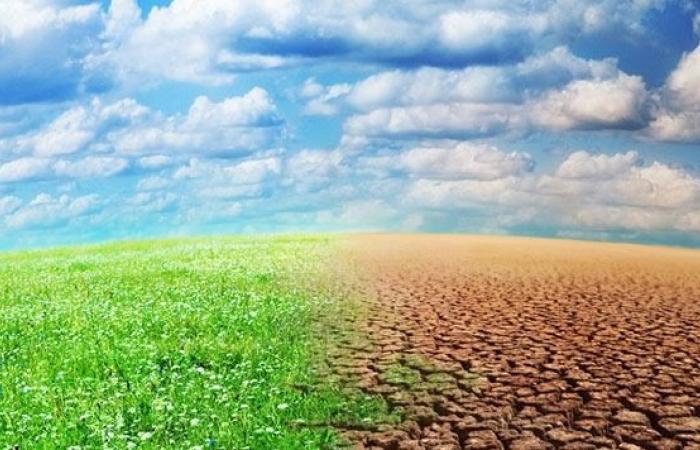Morocco, like many other nations, is suffering the dramatic consequences of climate change. The country’s water resources and vegetation are reaching critical thresholds, reflecting the devastating impacts of climate change. A recent report from the Global Water Monitoring Consortium highlights these growing consequences of global warming, which are manifested both in extreme weather phenomena and in a deterioration of ecological conditions.
The Global Water Monitoring Consortium (GWMC) report highlights that climate change is significantly amplifying water-related disasters, from prolonged droughts to torrential rains. These phenomena, which were already present in previous decades, are becoming more frequent and more serious, profoundly disrupting societies, economies and the environment. One of the main causes of this amplification is the increase in global temperatures, directly linked to the burning of fossil fuels. This warming not only intensifies the violence of weather phenomena such as cyclones and monsoons, but also changes their frequency, with increasingly frequent and violent events on a global scale.
In 2024, the average land temperature crossed a historic threshold, exceeding by 1.2°C the average observed between 1995 and 2005. This deviation from normal underlines the rapid progression of global warming and its effects on the planet. More than half of the world’s population, spread across 111 countries, experienced the hottest year on record, and 34 countries broke maximum temperature records.
Weakened ecosystems and an imminent water crisis
Extreme precipitation represents another key phenomenon in this climate deregulation. Months with low precipitation were 38% more frequent in 2024 compared to the 1995-2005 reference period. At the same time, extreme precipitation events, such as severe thunderstorms and torrential rains, increased by 52% over the same period. These disruptions in rainfall patterns cause devastating effects on agricultural land, infrastructure and biodiversity, exacerbating social and economic inequalities. The most vulnerable regions, such as rural areas of Morocco, particularly suffer from these extreme climatic phenomena, endangering food security and the livelihoods of populations.
Read also: Morocco: a new program to strengthen the climate resilience of agriculture
The year 2024 was thus marked by water disasters of unprecedented scale. More than 8,700 people lost their lives as a result of these disasters, and around 40 million people were displaced. The economic losses generated by these catastrophic events exceed $550 billion, which underlines the extent of the economic damage that these extreme phenomena can cause. Among the most destructive events are flash floods, landslides and tropical cyclones, which have caused considerable loss of life and property.
Morocco, like other nations, has been hit hard by these extreme weather events. The country is one of 12 countries to have recorded a record number of frost-free days in 2024, a situation which particularly affects agricultural regions sensitive to these climatic variations. The report indicates that Morocco shares this trend with countries such as China, Mongolia, Iran, Switzerland and Ukraine. The consequences of these climatic variations are visible through anomalies in vegetative cycles, with a progressive degradation of ecosystems.
Vegetation and water resources under pressure
In terms of vegetation, Morocco stands out among the 8 countries having observed exceptionally low values of the Normalized Difference Vegetation Index (NDVI). This indicator, which measures the health of vegetation, shows a worrying deterioration in the country’s ecological conditions. A similar phenomenon is occurring in other regions of the world, such as Zimbabwe, Zambia, Belize or Iceland, highlighting the global impact of climate change on ecosystems.
Water resources, already fragile in Morocco, are also in a critical situation. Surface water extent has reached historic lows in 2024, a phenomenon that is also found in 15 other countries around the world. In Africa, countries like the Democratic Republic of Congo, Mozambique and Burundi are facing a similar water crisis, while globally, nations like Brazil, Ireland and Turkmenistan are also hard hit. Morocco is among the eleven countries having recorded historically low values for the Total Water Stock (TWS), a crucial parameter for assessing the availability of water resources. This situation accentuates the country’s vulnerability to droughts and water scarcity.
The outlook for 2025 suggests worsening climate risks, with intensifying droughts in northern South America, southern Africa and parts of Asia. At the same time, traditionally wetter regions, such as the Sahel and Europe, could experience an increase in flood risks, highlighting the fickle nature of extreme weather events. Intensifying climate change increases the likelihood of extreme events on a global scale, including flash floods, heat waves and wildfires, making it more urgent for human societies to adapt to these growing environmental challenges. more pressing.






